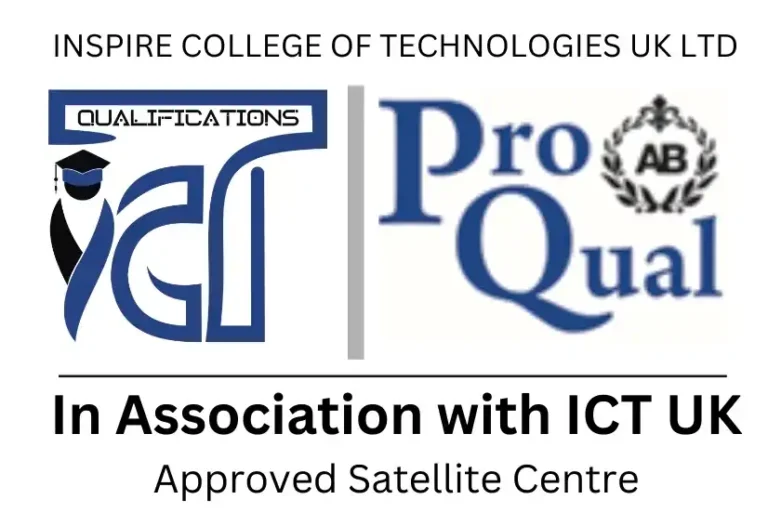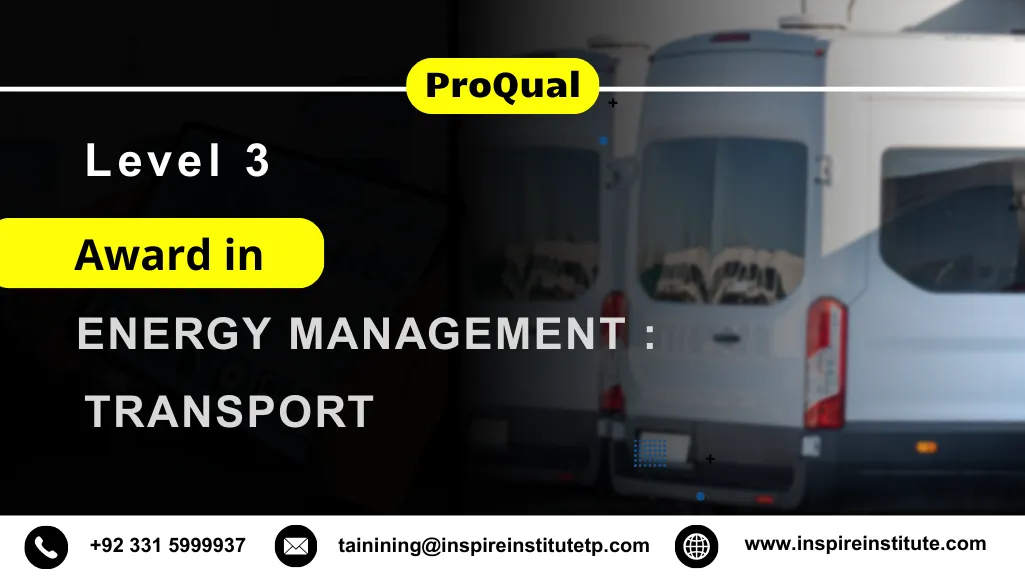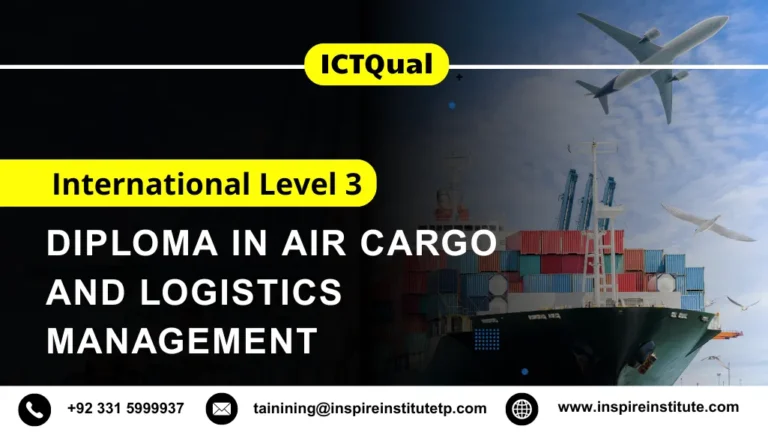ProQual Level 3 Award in Energy Management : Transport
The ProQual Level 3 Award in Energy Management: Transport is a nationally recognized qualification designed to equip professionals with the knowledge and skills to improve energy efficiency and reduce carbon emissions within the transport sector. As global emphasis on sustainability and environmental responsibility increases, the need for skilled energy managers in transport has never been more critical.This course focuses on the principles of energy management specific to transport systems, including fleet operations, logistics, fuel consumption, emissions monitoring, and sustainable transport planning.
Whether you’re aiming to support your organization’s environmental goals, reduce operational costs, or comply with energy and emissions regulations, this qualification offers practical and strategic insights tailored to the transport industry. Aligned with industry standards and sustainability objectives, this course is an ideal pathway for those looking to advance their career in energy management within one of the world’s most energy-intensive sectors.
Why Choose this Qualification
- Sector-Specific Focus
- Unlike general energy management courses, ProQual Level 3 Award in Energy Management : Transport is tailored to the transport industry, covering fuel usage, fleet energy efficiency, emissions reduction, and sustainable logistics strategies.
- Support Organizational Sustainability Goals
- Learn how to contribute to your company’s carbon reduction targets, energy reporting obligations, and long-term environmental objectives.
- Recognized Qualification
- Awarded by ProQual, a UK-regulated and internationally respected awarding body, this qualification enhances your professional profile in the energy and sustainability field.
- Practical, Job-Ready Skills
- Gain actionable knowledge that can be directly applied to transport operations, from energy audits to policy implementation and performance monitoring.
- Improve Cost Efficiency
- Learn how to identify inefficiencies and introduce strategies that reduce fuel costs, optimize routes, and lower total energy consumption in transport fleets.
- Career Advancement Opportunities
- Whether you’re already in the industry or transitioning into energy or environmental management, this qualification helps you advance into roles such as Energy Manager, Transport Sustainability Officer, or Compliance Coordinator.
- Flexible Learning Format
- Delivered in a flexible format suitable for working professionals, allowing you to develop new skills without interrupting your career.
Course Overview
UK Based Qualification
Course Level: Level 3
Average Completion Time:
6-12 Months
Mandatory Units : 1
Evidence & Assignment Based

Inspire Institute of Technologies is Approved Satellite Centre of ProQual
Qualification Structure
ProQual Level 3 Awards in Energy Management consists of 1 mandatory unit having 25 Guided learning hours.
Mandatory Unit
| Sr# | Unit Title | Unit Level | GLH |
|---|---|---|---|
| 1 | Energy Management : Tarnsport | 1 | 25 |
Who Should Take this course?
The ProQual Level 3 Award in Energy Management: Transport is ideal for professionals and organizations looking to improve energy efficiency and reduce the environmental impact of transport operations. This qualification is specifically designed for individuals involved in the management, operation, and sustainability of transport systems.
This course is suitable for:
- Fleet Managers looking to enhance the energy performance and sustainability of vehicle fleets, reducing fuel consumption and emissions.
- Transport Managers involved in logistics, route planning, and energy optimization within the transport sector.
- Energy Managers and Coordinators who wish to specialize in transport-related energy management and contribute to sustainable transport initiatives.
- Environmental and Sustainability Officers aiming to integrate energy-efficient strategies into transport policies and practices within their organization.
- Logistics and Operations Professionals who want to improve operational efficiency and support carbon reduction goals within transport and distribution.
- Consultants and Auditors who support organizations in energy audits, compliance, and the development of energy-saving strategies within the transport industry.
- Regulatory and Compliance Officers needing to understand and manage transport-related energy regulations and reporting requirements.
- Public Sector Employees responsible for managing energy consumption in public transport systems and infrastructure.
- Individuals Seeking Career Transition into energy management, sustainability, or environmental roles within the transport sector.
This qualification is perfect for anyone working in or aspiring to work in energy management, sustainability, and transport, offering a pathway to both professional growth and a positive environmental impact.
Course Benefits
Course Benefits of the ProQual Level 3 Award in Energy Management: Transport
1. Industry-Specific Knowledge
This course delivers targeted knowledge focused solely on the transport sector, covering energy management principles, fuel efficiency, fleet optimization, and emissions reduction strategies. Learners gain a deep understanding of how to manage energy consumption within transport systems—a vital area for modern logistics and mobility services.
2. Improved Fuel Efficiency and Cost Savings
Learn how to assess and reduce energy waste in transport operations. By applying what you learn, you’ll be able to introduce changes that lead to lower fuel usage, reduced idling time, efficient routing, and improved driver performance, resulting in significant cost savings for your organization.
3. Enhanced Sustainability and Environmental Impact
The transport sector is a major contributor to greenhouse gas emissions. This qualification helps you develop strategies that support carbon footprint reduction, integrate sustainable transport policies, and contribute to broader environmental goals and corporate sustainability initiatives.
4. Compliance with Energy and Emissions Regulations
With increasing national and international focus on transport emissions and fuel efficiency standards, the course equips you to help your organization stay compliant with regulatory frameworks and industry benchmarks, including energy reporting and emissions monitoring requirements.
5. Career Advancement and Professional Recognition
As a Level 3 regulated qualification awarded by ProQual, this course strengthens your professional profile and supports career growth. It can lead to roles such as Transport Energy Manager, Sustainability Officer, Fleet Analyst, or Compliance Specialist, or support promotion within existing logistics or operations roles.
6. Practical Application Across Various Sectors
The course is relevant across a wide range of industries, including logistics, public transport, freight, delivery services, government transport departments, and large-scale commercial fleet operators. The skills gained are easily transferable between roles and sectors.
7. Boost Organizational Performance
By helping organizations cut energy waste, reduce downtime, and operate more efficiently, trained professionals can add measurable value to their employer’s bottom line, while contributing to their long-term sustainability objectives.
8. No Prior Qualifications Required
With no formal academic requirements, the course is accessible to professionals from a range of backgrounds, including operations, technical services, environmental compliance, and logistics—making it ideal for both upskilling and reskilling.
9. Flexible and Accessible Learning
Offered through flexible delivery formats, this course allows learners to study at their own pace while continuing in their current job. It’s an excellent fit for busy professionals balancing work and personal commitments.
10. Foundation for Further Learning
The qualification also provides a stepping stone to more advanced studies in energy management, sustainable transport planning, or environmental compliance, opening up future progression opportunities in both academic and career pathways.
Eligibility Criteria
Work Experience: While prior experience in energy management is not essential, it is recommended that learners have some practical exposure to the transport or logistics sector, such as involvement in fleet operations, fuel monitoring, or transport planning.
Current Role: The course is ideal for individuals currently working in transport management, logistics coordination, sustainability roles, fleet supervision, or related positions where energy performance and efficiency are relevant.
Age Requirement: There is no specific age limit, but candidates should typically be 18 years or older, as the course is designed for individuals in or aspiring to managerial positions.
Basic Literacy and Numeracy: Learners should possess basic reading, writing, and numeracy skills, as these are essential for understanding course materials, completing assignments, and interpreting energy data and reports.
Commitment: Learners should demonstrate a strong interest in energy efficiency, sustainable transport, and environmental responsibility, as well as a commitment to applying their knowledge to real-world situations.
English Proficiency: A good level of spoken and written English is required to follow technical content, engage in assessments, and communicate effectively within a professional context.
The Qualification Process
Here is a step-by-step guide to help you understand the entire journey from pre registration to certification:
1. Self-Assessment
Before enrolment, learners complete a self-assessment to evaluate their current knowledge, experience, and readiness for the course. This helps identify learning goals and ensures the course aligns with their career objectives.
2. Registration
Eligible learners are formally registered with an approved ProQual training provider. At this stage, learners receive access to course materials, learning resources, and assignment guidelines.
3. Induction
An initial induction session is conducted to introduce learners to the course structure, assessment methods, evidence requirements, and the support available throughout the qualification journey.
4. Evidence Submission
Learners are required to submit a portfolio of evidence demonstrating their understanding and application of energy management practices in transport. This may include written assignments, case studies, reflective statements, project reports, or workplace documentation.
5. Feedback and Revision
Assessors provide detailed feedback on submitted work. Where necessary, learners are encouraged to revise and resubmit specific elements to ensure they meet the required standards and fully demonstrate competence.
6. Competence Evidence
Throughout the course, learners must show evidence of competence in real-world or simulated scenarios, highlighting their ability to apply energy management strategies effectively within transport systems.
7. Internal Quality Assurance (IQA)
All learner submissions are reviewed through an internal quality assurance (IQA) process conducted by the training provider to ensure fairness, consistency, and compliance with ProQual’s standards.
8. External Verification
ProQual conducts external verification of a sample of learner portfolios to ensure quality control and confirm that the assessment process has been conducted in line with national qualification standards.
9. Certification
Once all assessment criteria have been successfully met and verified, learners are awarded the ProQual Level 3 Award in Energy Management: Transport. A formal certificate is issued, recognized across the UK and internationally.
This comprehensive process ensures that learners demonstrate all necessary competencies and meet the high standards required for the ProQual Level 3 Diploma in Management.







